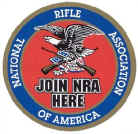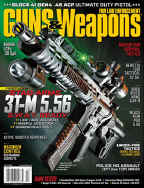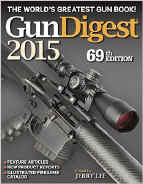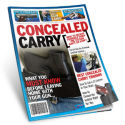Buying A Gun
What is my advice on
purchasing a gun?
This is my most visited
page!!!
This Page Last Updated 10/30/2013
Not an NRA Member? Shame on you!
We would not even be having this conversation
on the topic of gun rights in America if it wasn't for the hard work and
dedication of the National Rifle Association. You say that you don't have
the money??? An Associate Membership (no magazine) is just $10.00 per
year, that's less than three cents (-$0.03) each day. Before you do
anything else, do your duty and support the NRA through your membership. JOIN
THE NRA TODAY. You can save $10.00 on a regular annual membership by
using the link I've just provided, making it just $25.00. JOIN
TODAY.
"The
Second Amendment is the backbone, the keel, the keystone and compass without
which, freedom is invariably lost."
Charlton Heston, American
actor, patriot and NRA President (2003)
Bookmarked subjects on this
page.
|

JOIN
THE NRA TODAY!! |
NRA MEMBERSHIP BENEFITS
-
$1000 Firearms and Archery Equipment Theft & Fire Insurance.
-
$10,000 Personal Accident Insurance ($25,000 for members of law enforcement.)
-
Your choice of annual magazine subscription to either American Rifleman, American Hunter, Women's Outlook or America's First Freedom.
-
A Black & Gold Shooter's Cap.
-
and much more!!
See my "NRA
Membership" page for more details. |
HOW
TO CHOOSE A HANDGUN E-BOOK!
I have written a forty eight (48) page e-book on the subject of choosing
the right handgun. This
is a complete e-course on how to go about choosing the right handgun for
you.
It's finished and ready
for download right now! The e-book is now available with any
contribution made through my 'Contributions'
page.
I go into reliability, action, caliber, barrel length and test firing
concerns as well as a comprehensive section on firearm safety and much more...
The specifics on this new
e-book are:
To learn more go to my My E-Book
page now!
Will you make these common mistakes when buying your first
handgun? Find out now. Contribute now and you'll be automatically
directed to the URL of the e-book where you can save a copy of it yourself in
.pdf format.
My Gun Maker Links could
be the largest compilation of links to the world's gun makers. Let
me know if you find better. Currently 167 Gun
Maker links!!!
E-mail me here if
you find a larger collection of gun maker links or you want to add a gun maker
that I missed.
This is my most visited page by a wide
margin. The information I have here has benefited literally tens of
thousands of visitors.
Can you make a special
contribution to help keep this effective and informative Web site online for
another year?
Allow me to keep fighting to SAVE THE
GUNS. Contribute today. Support my
efforts by credit card or by check.
The Decision
The decision to purchase a gun is not a choice that should be
taken lightly. Many, many things must be considered first.
As an American citizen you have a constitutional right to own
the firearm of your choice, as long as you have not broken the law in your
past. Convicted felons, drug addicts and mentally incompetent people do
not have that right under federal law.
Some states however believe that the Second Amendment
does not mean what it says. Some states and localities have put such
restrictions upon firearm purchases that even the most well behaved among
us cannot purchase the firearm of their choice.
Join
the NRA today to help me fight for your rights! Only about 5% of
gun owners are NRA members and that just makes me angry...
What a decision!!!
Bringing a firearm into the home is a decision that
should never be taken lightly and without deliberative thought.
There are many things you should be thinking about. Some of these
things are proper storage, how often you'll practice, children in the
home, whether or not you'd use the firearm for self defense and many other
things. You should also determine how you are going to store ammo as well.
Remember that a gun is simply a device that you can use which
stores, aids in aiming and fires ammunition. A firearm won't do anything
else except launch a bullet.
Of
course a firearm used by an armed homeowner can scare the pants off a burglar,
but other than that, all a firearm does in fire a bullet in a relatively straight line.
Can a firearm play a role in a larger
overall plan of home defense, yes, of course it can.
For more information
on self-defense, please see my page titled Self
Defense. It is easily accessible on the Navigation bar to your left,
or just click here.
Should I buy a gun for concealed carry?
Many states in the United States have
recently relaxed concealed carry laws for honest, law-abiding gun owners.
Is it a coincidence that violent crime committed against citizens has dropped in
those states? I THINK NOT.
As of
this writing, 48 states have laws that permit private citizens to
carry concealed firearms in public, only 39 of these are "Shall
Issue" states that will issue a permit to any qualified law abiding
citizen. This leaves only the two states of Wisconsin and Illinois that
have no provisions at all for carrying a firearm concealed in a public
place.
While states have relaxed these
laws, violent crime committed with
firearms is falling and is at a thirty year low. One of the lowest
states in acts of violent crime per capita does not even require a concealed
carry permit. What idiot would rob someone who is probably carrying a
firearm? How many police officers do you know have been robbed of their
wallet at gun point? I'm sure you get my point...
Concealed carry of a firearm in public
is a very personal choice. The decision to carry a firearm in public,
should be weighed very carefully and thoughtfully.
Ask yourself these questions while
deciding whether or not to carry a concealed firearm in public.
-
Do I have the proper mindset, to
have a gun under my control in a public place. Is safety ALWAYS
my FIRST
concern?
-
Would I panic in terror at the
first sign of trouble and completely lose my mind and control of all bodily
functions? Would I become a quivering puddle of gelatin on the floor,
or would I be able to stand my ground in the face of possible serious injury
or death?
-
Could I take the life of another
human being in order to save my own or that of a family member?
Think long and hard about this.
I talk about the religious implications of defending yourself on my "Self-Defense"
page.
Recommendations
Whether you are buying your very first gun or just adding to
a large collection, there are many things to consider. The MOST important
thing to consider before I get into everything else, is that the firearm fits
your hands and body. Hands that are too small for a particular handgun or
hands that are too large for a smaller handgun will likely require the
readjustment of your grip in between rounds, which is unacceptable.
Fingers that are too short to reach the trigger or too long, beyond the trigger
will pull the barrel's direction one way or the other during the trigger
squeeze. Rifles, shotguns or some larger handguns that are too heavy or
hard to use will likely shorten your practice sessions etc.. So, first you
must purchase a gun that fits your physical characteristics.
1. Is the gun just for recreational target practice?
If so, I recommend a .22 Long Rifle caliber in a handgun or rifle. Go with a
popular and longstanding manufacturer such as Sturm-Ruger, Winchester, Marlin or
Remington. The Sturm-Ruger 10-.22 rifle is a perfect choice.
2. Is the gun for home defense?
I recommend a 12 gauge shotgun with a 20" barrel, or a .38 Special
revolver. Semi-automatics should be considered for defense after you have
become proficient with a firearm. I personally have both. I own a
Mossberg 590 A1 with their marine-coat finish. It's a nine-shot 12
gauge shotgun with just a twenty inch barrel. In addition, both my
wife and I have a Ruger GP-100 .357 magnum revolver and a Ruger SP-101
also in .357 magnum.
I don't usually recommend semi-autos for
"first-timers". For a home defense shotgun, I recommend models
from Mossberg, Winchester and Remington. For a revolver, I recommend
models from Sturm-Ruger, Dan Wesson and Taurus International. Semi-autos
are okay for first time shooters, IF you are going to take the time to know the
pistol inside AND out and practice with it regularly to the point where
operating it is instinctive.
I recommend that you use the "pistol grip only"
shotguns just for "showing off" at the club and not for serious home
defense. I recommend full shoulder stocked shotguns for home defense with
a barrel not longer than 20".
Guns used
for defensive purposes should be able to reliably cycle at least 500 cartridges
without a single malfunction. Your life may well depend upon it.
3. Is the gun for concealed carry?
I recommend revolvers or semi-automatics with a 4.5" barrel or less.
Most barrels of longer length are harder to conceal. For concealed carry,
I could recommend hundreds of models of quality firearms. However, if I
was to settle on a single caliber and model, it would be one of the Sig Sauer semi-automatics in .40 S&W
caliber, perhaps the Sig Sauer P 226.
4. Which gun is right for my body?
People of slight build should not consider the most powerful firearms in each
category. Large shotguns and rifles might have to be cut down to properly
fit those of small stature or small hands.
5. Will the gun be diligently cared for?
Stainless steel will not corrode and oxidize as readily as "blued"
steel. You should make sure that you keep your firearms in top
condition. Do not allow them to corrode and degrade to the point where
their reliability may be in question. Plus, it is EMBARRASSING to take out
a firearm to show to an interested dinner guest and have it be all dusty, filthy
or rusty. :-)
Interesting
Fact:
**According to at least one study I've read about 11% of all privately owned firearms in the United States have never been
fired. Practicing with a self-defense firearm is an important aspect of gun
ownership that has been neglected in most families.
6. How much are
you prepared to spend? An inexpensive bargain firearm may not
function properly and reliably. You usually get what you pay for when it
comes to a gun purchase. Be prepared to spend between $300 and $1200 for a
quality firearm. If you spend under $100.00 for a small .25 ACP, you may
be compromising too much!!!
How you answer these questions, will determine the direction
your purchase should go.
Rifle, shotgun or handgun? Do you know which type of
firearm you want? As a first gun for a child, I always recommend a single
shot .22 cal rimfire rifle. A single shot .22 bolt-action rimfire is easy
to learn and will not be too overpowering for a child. The child should be
made completely aware of all the safety rules and loading/unloading
procedures.
Make sure the child knows the manual for his/her new gun and
keeps it in good condition. He/she should also be taught to keep the
firearm and ammo locked up and secure until it is time to head out to the
range.
The importance of safety
can never be overstated.
I have
published the single largest and most comprehensive page of gun safety
rules and tips found anywhere in the world. I have come up with more
than fifty gun safety rules and tips and my "Safety
Rules" page has garnered top search engine rankings in the world
for years for the search terms of "gun safety rules" and
"gun safety rules for kids".
Rifles
Is the purchase going to be a centerfire rifle for hunting
purposes? If so, then what game do you foresee taking with the
rifle? A good all around caliber for most North American game is the
.30-06 Springfield. I always advise to go with a well-known
manufacturer. Some of the major firearm manufacturers have been in
business for much more than a century and their firearms are going to be quality
pieces of machinery.
My choice for a
centerfire rifle is a Winchester Model 70 in 30-'06 Springfield.
Is the rifle comfortable? Go to a reputable dealer and
ask to see many different makers and models. How do they feel? Can
you comfortably reach the trigger without stretching?
Try this.
Place the butt of the rifle in the joint between your forearm and your upper
arm, if your index finger cannot comfortably reach the trigger, then you might
have to have the gun's stock cut down. If your index finger goes all the
way to the front of the trigger guard, the rifle may be too small, or you may
need to add a butt stock pad.
Do you foresee going after large and possibly dangerous
game? If so, please consult an experienced hunter. The proper
caliber and bullet weight is a very important consideration in this arena.
Will you go with a scope or regular iron sights?
Generally high-powered centerfire rifles should have a telescopic sight.
Most rimfire rifles used for recreational plinking do not need a scope on them,
but some people enjoy plinking at cans at one hundred yards. And a can is
awfully small at a hundred yards.
If your purchase is a first rifle for a child, I
would recommend a single shot bolt action .22 Long Rifle from a well
known manufacturer. If you're comfortable getting a child a
semi-automatic rifle, you can't do any better than a Ruger 10-.22.
Shotguns
What kind of shotgun should I use? There are many
different gauges of shotguns. What does shotgun gauge mean? Is it
the same as caliber?
Interesting
Fact:
Shotgun gauge is a measurement of the bore
size. It is determined by taking one pound of lead and dividing the pound
of lead into round balls. When you take a pound of lead and divide it into
twelve (12) round balls, each ball is said to be 12 gauge and would fit into the
barrel of a twelve gauge shotgun. Therefore, the bore size on a ten gauge
shotgun would be larger than a twelve gauge.
The most commonly available shotgun gauges are:
10 Gauge- The ten gauge is the largest of the commonly
available shotgun gauges.
12 Gauge- The twelve gauge is the most popular shotgun
gauge and can be found in a large number of configurations.
16 Gauge- A general purpose gauge between the 12 gauge
and the 20 gauge.
20 Gauge- This is a good gauge for a first shotgun or
one for most women.
28 Gauge- Mainly for small birds and rabbits.
.410 Gauge/Caliber- The .410 is the smallest caliber shotgun.
It is mainly used for pest control and some small game.
The twelve (12) gauge comes highly recommended as a good gauge for
home defense use. However, most experts recommend a much shorter barrel
for this purpose. A shorter barrel is recommended to make the shotgun more
easily maneuverable in tight spaces. The choice of ammunition for a home
defense shotgun is a hotly debated issue, however, I will go out on a limb and
recommend the number 4 buckshot.
I
think it is important to note at this point a common misconception about the
shotgun for home defense. The common misconception is that the spreading
shotgun pellets will make the violent criminal intruder easier to hit.
Common
distances at which a self-defense shooting occurs inside a home are usually just
outside of arm's length. Self defense shootings occur most often inside of twelve (12) feet.
At
this distance, the shotgun pellets or buckshot load will not open very much at
all and will more than likely result in one large wound channel. The
violent aggressor will not be covered head to toe in lead by any stretch of the
imagination. Another myth dispelled!!!
The shotgun barrel must be at least 18 inches long as
required by the National Firearms Act of 1934. A good barrel length for a
self defense shotgun is 20 inches. A twenty inch barrel is a good
compromise between lost power and maneuverability.
Handguns
So, you think you want to purchase a handgun? The term
"handgun" was first used in 1388. It has been around for quite a
while now. The first semi-automatic handgun was made in 1895. Now
more than 105 years later, they work pretty much the same as they did then.
There are basically three different types of handguns.
The three basic types are revolver, semi-automatic (sometimes called an automatic) and
derringer.
A revolver is easier to use, easier to clean and more simple
to learn. The semi-automatic is a bit more complicated to clean, learn and
use. The derringer is a single shot pistol, sometimes found with two to
four separate barrels. The derringer is usually easier to conceal and is
mainly used for that purpose. I don't know of many serious derringer
target shooters.
I almost always suggest a revolver as a first handgun,
because they are easy to operate, easy to care for and it's easy to see if they are loaded or not.
If you foresee using the revolver only for plinking and
recreational use, get a .22 caliber long rifle rimfire revolver from a manufacturer that has a good reputation. If you foresee using the revolver
as a concealed carry firearm, you should go with a minimum of .38 Special for
the caliber, better yet, go with a .357 Magnum revolver and use .38 Special
ammunition in it until you feel comfortable with a higher power load.
I
might mention now, that the 125 grain jacketed hollow point in .357 Magnum, at
an average factory velocity of 1250 ft/sec is the top self-defense round for
"one shot stops" from a handgun.
How about a home-defense gun for a woman? I would
recommend a .38 Special revolver from a maker like Sturm-Ruger. Their
sturdy and reliable SP-101 in .38 Special or .357 magnum is nearly a perfect choice.
Smith & Wesson carries an entire line of firearms made
specifically for women. Be aware of .38 caliber or above firearms that are
too light. Very lightweight firearms may at first seem like a great idea,
until you shoot it. The recoil is terrible on very lightweight
guns.
There are a series of steps that you should consider when
choosing what handgun to purchase. There are many things to
consider. What will you use the gun for?
What is the purpose for your handgun purchase? If it's
for recreational target shooting, you'll probably want something in .22 Long
Rifle caliber. Check out the Ruger Mark II semi-automatic pistols.
If you're more comfortable with a revolver, that's fine too. For a .22
Long Rifle revolver, I'd check out the Ruger SP-101 revolver series. Yes,
you can plainly see, I'm taken with Ruger Firearms. They're quality
firearms at a reasonable price.
There are many calibers available to the revolver aficionado.
.22 Long Rifle- Best for a first gun and plinking.
.32 Magnum
.32 H&R Magnum
.32 Smith and Wesson
.38 Special- Great gun for a lady.
.357 Magnum- My choice.
.357 Maximum
.41 Magnum
.44 Special
.44 Magnum- Anything .44 magnum and above are fun to shoot,
but can be too overpowering for strategic self-defense use.
.454 Casull
.460 S&W Magnum
.480 Ruger
.500 S&W Magnum
There are many more, but you're likely not going to find all
of them at your local ammunition supplier.
A semi-automatic handgun is for an experienced firearm user
who is comfortable with the operation procedures involved. A revolver is
much less complicated to use. A semi-automatic handgun requires a bit more
practice to use quickly and efficiently.
A semi-automatic is fed ammunition from a spring-loaded
magazine.
There are many calibers available for the semi-auto
pistol fan too.
.22 Long Rifle
.25 ACP (Automatic Colt Pistol)
.32 ACP
.357 SIG
.380 ACP- About the least I can recommend for defensive use.
9mm- The most popular choice.
.40 S&W-My choice.
10mm- The choice of a U.S. Marine friend of mine.
.45 ACP- Many world experts swear by this caliber.
After all, it helped America stay a free country by being the sidearm of choice
of the American Armed Forces for many wars in which we were involved.
First invented in 1905.
.50 Action Express
There are many more, but you're likely not going to find all
of them at your local ammunition supplier.
Do you have a suggestion on how I can
improve this page for you? If you have a suggestion on something about
this page, or this Web site that you would like to see, just go to my
"Feedback" page and tell me about it. I can't read minds
yet... :-)
Can you make a special
contribution today to help keep this effective and informative Web site online
for another year?
Gun
Maker Links
This could be the largest
list of gun makers on the Internet. 167 Gun Makers.
If you find a larger list of
gun makers, please e-mail me.
*
Takes you to another page.
Check out these links
for buying guns online
USAGunSales.com
http://www.supershoppingguide.com/Guns/main.htm
http://www.mswebmasters.com/gunexch/
AuctionArms.com
Privategunsale.com
GunFinder.net
SellAWeapon.com
GalleryofGuns.com
SellAGun.com
http://www.the56.com/
Back To The Top.
| 





